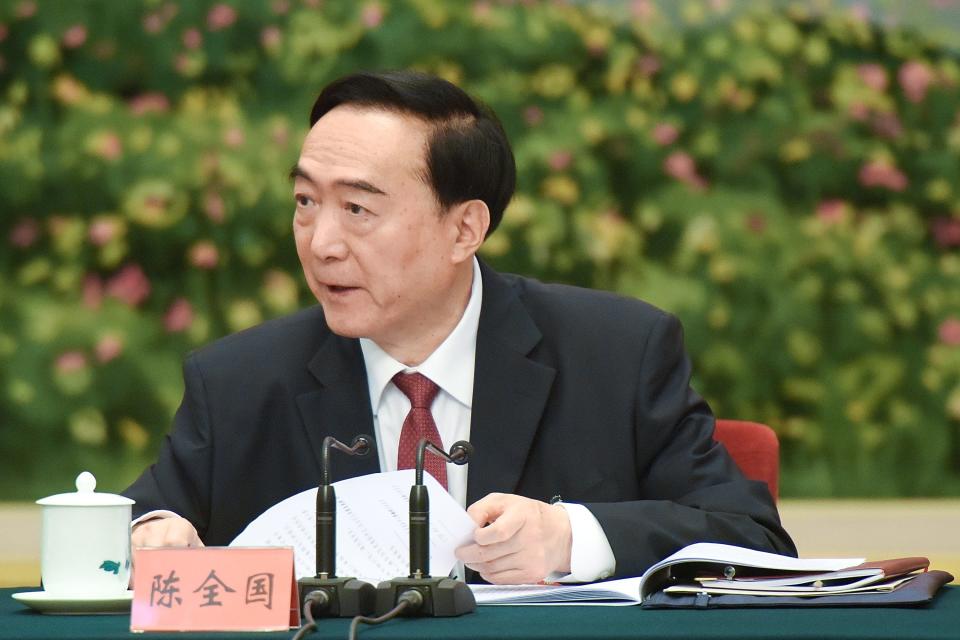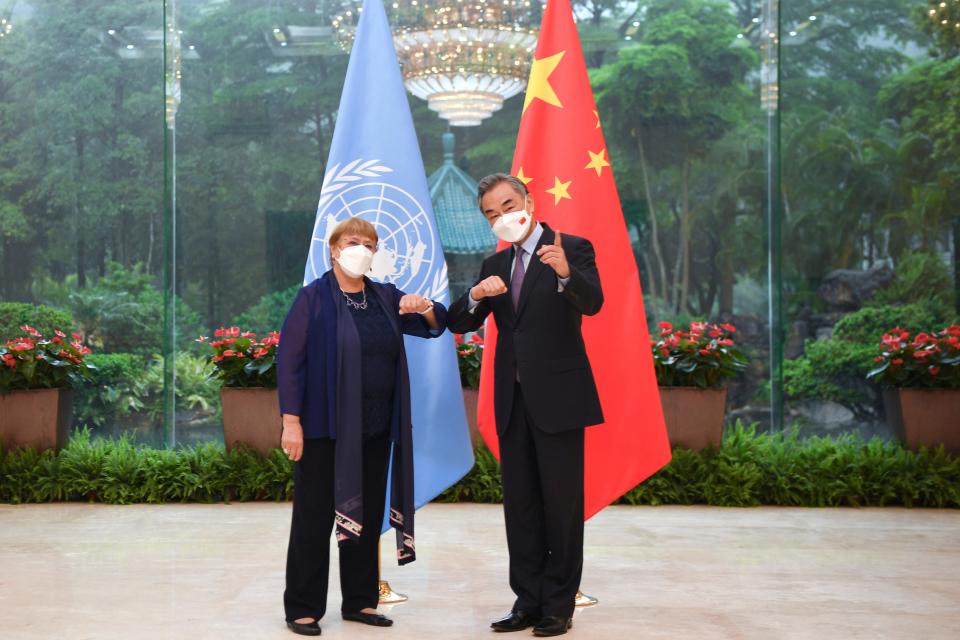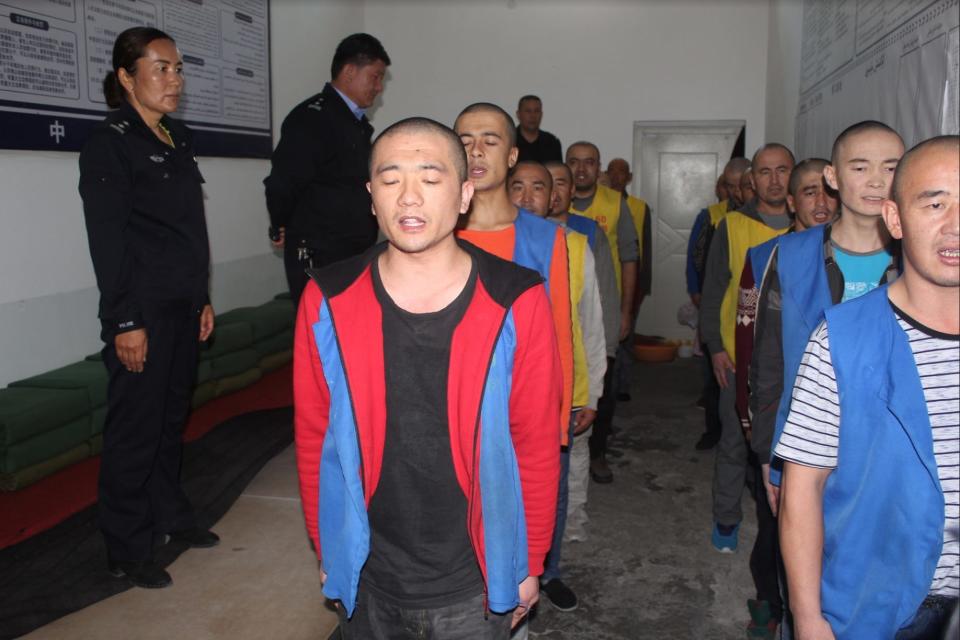'Courting death': Chilling words from the Chinese official behind Uyghur internment camps
The landscape of northwest China – in Xinjiang, also known as the Xinjiang Uyghur Autonomous Region – is bordered by high mountains with desert plains below.
It is a picturesque backdrop for an ugly reality: The alleged mass internment of the Uyghurs, an ethnic and mostly Muslim population that makes up about 50 percent of Xinjiang’s population, or about 12 million people.
Chinese officials claim the Uyghur population is rife with extremists who pose an existential threat to the country and need to be re-educated. Experts on Xinjiang and human rights advocates say China is engaged in ethnic cleansing of a minority group that makes up less than 1% of China's total population.
At the center of the campaign to “educate” or repress the Uyghurs for the past five years is Chen Quanguo, in charge of the Chinese Communist Party's security in the region from 2016 to 2021. A protege of Chinese President Xi Jinping, Chen is a party loyalist known for his embrace of harsh policing tactics.
Hacked documents from Chinese police, at the center of a new report from USA TODAY and a coalition of other media organizations, shed light on just how harsh those tactics may be.

"The high-pressure strike hard posture cannot be weakened in the slightest," Chen told local party officials, according to a transcript of his speech included in the files. The “strike hard” term refers to Beijing’s campaign to stamp out what it says are extremist elements in Uyghur society.
A trove of documents obtained by a U.S.-based researcher – and provided exclusively to an international media coalition including USA TODAY – includes transcripts of internal speeches by Chen. Researcher Adrian Zenz, in a new report analyzing the leak, says the internal police documents provide extensive new evidence of Beijing’s policies.
The speeches are nearly impossible to independently verify, but the files' dates place them in the same timeframe as the time period of all the other files obtained. Reporters in the media coalition independently verified portions of the other files in the document trove.
Subscriber exclusive: A hacker, a researcher and thousands of photos: Inside China's secret Uyghur detention system
Visual story: Hacked data and photos offer unprecedented evidence of China's secret Uyghur detention system
UN visit to Xinjiang
The new disclosures come as the UN High Commissioner for Human Rights Michelle Bachelet is visiting Xinjiang this week – the first such visit since 2005. Bachelet has come under fire from human rights groups who say she has delayed the release of a UN investigation into alleged abuses in Xinjiang, a probe she first announced in 2018.
The new disclosures could complicate Bachelet's already fraught visit. The U.S. and other Western countries denounced the new disclosures as fresh evidence of China's human rights violations in Xinjiang.
The State Department's chief spokesman Ned Price said Bachelet's team will be operating under such tight restrictions that they will not be able to conduct a real investigation into the human rights situation in Xinjiang.
"We think it was a mistake to agree to a visit under these circumstances," State Department spokesman Ned Price said on Tuesday.

In Beijing, Foreign Ministry spokesman Wang Wenbin declined to say whether Bachelet's team would be able to visit the so-called vocational centers or to interview Uyghur "trainees" while they are in Xinjiang.
"This visit is a trip to enhance mutual understanding and cooperation, as well as to clarify misinformation," he said. He said Bachelet will have "extensive exchanges with people from all walks of life during her visit to China."
He also dismissed the new revelations by USA TODAY and other outlets as "lies and rumors."
"Xinjiang enjoys peace and stability, its economy is thriving and its people live and work in peace and contentment," he said.
While some Communist Party officials have suggested the government was dismantling its vast network of the “educational” facilities, Chen offered a very different glimpse of Beijing’s plans, according to a transcript that Zenz says was a speech made June 18, 2018.
“The separatists are lurking beneath the current state of high-pressure, and if this state changes, they will reappear after a while,” Chen said, according to a translation independently verified for USA TODAY by a Mandarin speaker. Chen, according to the transcript, said the fight against terrorism is "complex and arduous" and called on local party officials to "earnestly prepare for a long-term struggle."
But perhaps his most chilling remarks came when he spoke about preventing escapes from the internment facilities. He said the camps have "multiple lines of defense, walls of copper and iron."
And if anyone tries to breach them, "fire must resolutely be opened," he said.
China’s policy toward Uyghurs and other ethnic minorities fits within a larger pattern in the history of modern-day China, where policies have cycled through periods of oppression and openness.
The hardline days of the Cultural Revolution, when Maoism reigned supreme, saw massive upheaval, oppression, purges, torture, public shaming and worse. But unlike the tactics of the 1960s Red Guards, observers say monitoring of minorities such as Uyghurs is high tech. Cameras surveil the Uyghur population’s moves and new technologies are used to flag what authorities view as suspicious behavior.
A Communist party leader
Enter Chen, a Communist party leader who previously ramped up Beijing’s police presence in Tibet, where Xi has also increased efforts to stamp out the region’s identity and culture through "re-educational patriotism."
“He implemented some forms of … very highly securitized forms of urban policing in Tibet just before he arrived to Xinjiang,” said Michael Clarke, a senior fellow with the Australian Defence College and an adjunct professor at the Australia-China Relations Institute. “That has been replicated in Xinjiang ... (But) the scale and intensity of the repression is many, many times beyond what happened in Tibet.”
Clarke, who reviewed Zenz’s report, said Chen was sent to Xinjiang as an “implementer” of Xi’s strike hard campaign – “the man who had the ability to essentially keep the party in line and say, ‘This is what has been mandated by the central government, by the Politburo Standing Committee, and you're going to do it’.”

The U.S. sanctioned Chen and other Communist Party officials in 2020 for their roles the mass internment of Uyghurs.
Following his arrival in Xinjiang, “Chen began implementing a comprehensive surveillance, detention, and indoctrination program in Xinjiang, targeting Uyghurs and other ethnic minorities,” the U.S. Treasury Department said in its announcement of Chen’s blacklisting.
A targeted minority
The Uyghurs live with Kazakh and Kyrgyz communities, all of whom are ethnically Turkic and many of whom are Muslim. According to Human Rights Watch, arrests in Xinjiang in 2017 accounted for 21.5% of all arrests in China, while the region has only 1.5% of China’s population.
There were 55 ethnic minorities when the Communist Party took over China in 1949.
Xi Jinping's government views the Uyghurs as a threat in part because some have sought greater autonomy or even a separate state, in certain cases resorting to violence to protest the Han-majority's rule from Beijing.
Xi Jinping decided to label Uyghurs as terrorists and launched a concerted campaign to eradicate the Uyghur identity, according Andrew J. Nathan, professor of political science at Columbia University specializing in Chinese politics and human rights.
“Xinjiang has two million people who have been influenced by separatist and pan-Turkist thinking, southern Xinjiang has more than two million people who have been severely influenced by the osmosis of extremist religious thought,” Zhao Kezhi, another top Communist Party official, says in the transcript of his June 2018 speech.
For those who do not follow orders, Chen would tell the local officials, “round up all who should be rounded up."
The People's Republic of China is not the Soviet Union, because “we have the wise leadership of General Secretary Xi Jinping and the backing of 1.3 billion of the people and millions of troops,” Chen said.
Chen invoked Chinese President Xi Jinping in his 2018 speech, noting "the wise leadership of General Secretary Xi Jinping and the backing of 1.3 billion of the people and millions of troops."
He warned that no organization, political party or individual could be allowed to "separate an inch from China's territory, in any form or by any terms." To do so would be "courting death," he said.
Re-educating targets
Chen is stern and unapologetic about carrying out the duties of the party. In a transcript of an internal speech from 2017, Chen lambasts the Kizilsu Prefecture for an overly soft approach when detaining re-education targets. That's an area in south Xinjiang.
Chen said when police make arrests, especially of those returning from other countries, they should “arrest them as soon as they see them” and “deal with them as with serious criminal offenders."
Handcuff them, put on a face mask, and “use ankle shackles if needed,” Chen said.
Photos Zenz says were taken inside a camp in Tekes, included in the data trove obtained by USA TODAY, show detainees shackled and in some cases hooded. Those who have escaped describe horrific conditions.

Re-education of Uyghurs is the humane thing to do, Chen argues, claiming that detainees can receive visitors and that those on good behavior can have visitors.
From Beijing’s perspective, it is doing the Uyghurs a favor by assimilating them into a great country, Nathan explained, adding that the Chinese government believes that Uyghurs are being used by the United States for propaganda.
Clarke said the content of the speeches was not surprising, but what struck him as most interesting was the “sense of crisis” that comes through Chen’s remarks. “… This idea that, you know, the party actually really felt that it was facing some kind of existential crisis in its ability to govern Xinjiang that necessitated they go down this route of a mass internment, reeducation, however we want to frame it … This was for them the logical endpoint here of dealing with what they saw as this kind of existential crisis in Xinjiang.”
Complete control
Under Mao's Cultural Revolution from 1966 to 1976, Red Guards drove out monks and destroyed temples, Nathan said. Enemies of the people were killed, imprisoned or paraded and shamed publicly during that era.
Xi has been compared to Mao in their authoritarian styles but the two leaders are very different, Nathan said. Mao thrived on rallying under chaos while Xi is methodical.
The goal of the Chinese Communist Party under the current regime is a complete control blanket over society, Nathan said. The party has implemented facial recognition technology, modernizing surveillance of minorities, he said.
As Uyghur children are forced into boarding schools and taken away from their culture, "The kids are losing their language, and with that, everything goes," Nathan said.
Deirdre Shesgreen of USA TODAY contributed.
Mary Chao 趙 慶 華 covers the Asian community for NorthJersey.com. Email: mchao@northjersey.com
This article originally appeared on USA TODAY: Xinjiang police files: Chilling words from official behind Uyghur camps

 Yahoo Movies
Yahoo Movies 
